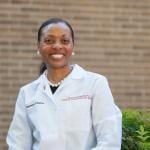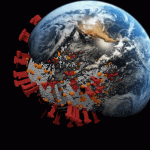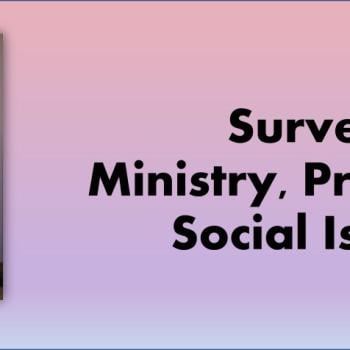She’s a black, millennial, Evangelical, zoologist/biologist whose specialty is studying birds. And she’s concerned about the climate crisis and its effect on the beloved animals she studies. Meet Corina Newsome whose work focuses on connecting faith, science, climate action, education, and conservation.
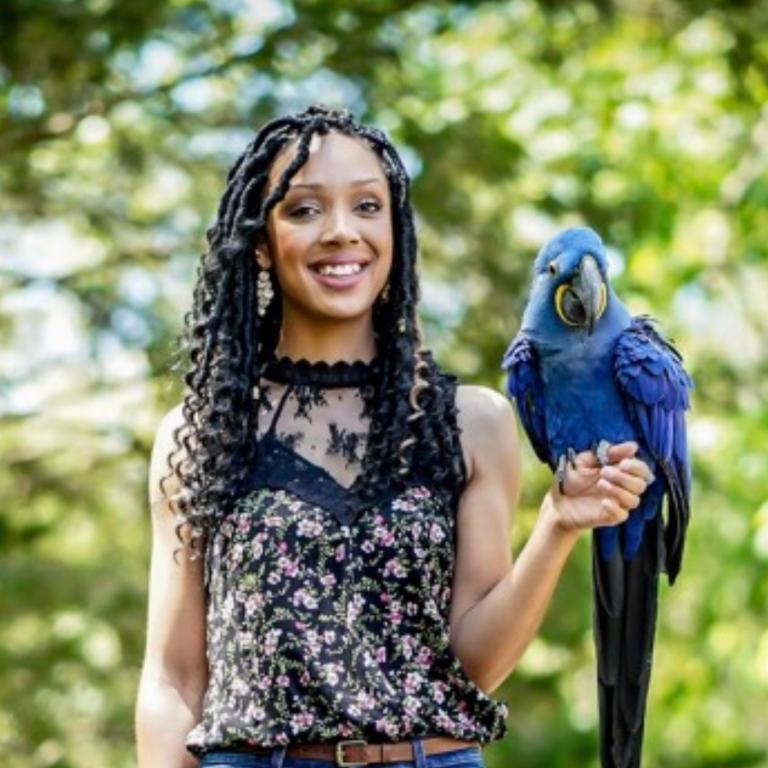
This the final post celebrating a “green” Black History Month.
This series has highlighted four authors from Rooted and Rising: Voices of Courage in a Time of Climate Crisis (Rowman & Littlefield, 2019). Rev. Gerald Durley, Rev. Lennox Yearwood, and Dr. Natasha DeJarnett have each helped us understand the connections between race, climate, and justice. Corina Newsome gives us a fresh angle—she researches the effects of climate change on wildlife and their habitats. “As a Black woman, all of these efforts are rooted in dismantling the systems that have kept people like me out this field.”
Corina Newsome serves on the Steering Committee of Young Evangelicals for Climate Action.
Recently transitioning from her career as a zookeeper, she is currently a graduate biology student at Georgia Southern University, specializing in avian conservation. Newsome earned her B.A. in Zoo and Wildlife Biology from Malone University (Ohio) in 2015. As an undergraduate, she served as the Student Director for Multicultural Student Services and founded a student-led wildlife outreach education program. Since graduating, she has founded and directed several programs to encourage socioeconomic and ethnic minority high school students to consider careers in wildlife science.
Corina also has one of the coolest Twitter feeds on wildlife you will ever see.
Her handle is @hood_naturalist, and she has nearly 45,000 followers. I’m one of them, and she delights us with short video clips showing the fascinating features of creatures great and small. Her joy in studying nature is infectious, especially when she is teaching young students about birds and animals.
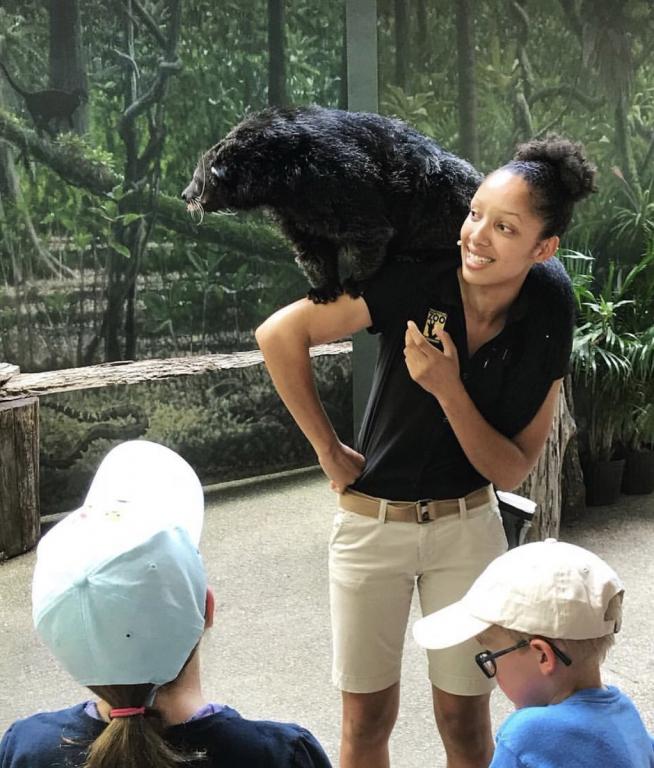
Having grown up in the urban center of Philadelphia, Corina has always had a desire to participate in, and advocate for, the protection of wildlife and natural spaces.
Her goal is to encourage minorities in the U.S. to explore the great outdoors. “My hometown of Germantown in Philadelphia, Pennsylvania, was, in many respects, bleak,” she recalls. “There was minimal green space, and as a result, very little observable wildlife. Growing up in this poor, heavily urbanized area of Philadelphia, I didn’t have many opportunities to look closely at the details of Creation.”
But she did have her grandma’s National Geographic magazines. “With each new stack of magazines, I saw flowers and lemurs and dangerous jellyfish. The picture of the Masai Mara National Reserve in Kenya didn’t exist only as a picture in the centerfold: I felt its heat and life. Looking at the pages of these places I hadn’t been, and things and people I hadn’t seen, didn’t make me unhappy with my circumstances—but I knew I wanted to see the natural world for myself. So, when the time came, I decided that I would make a career out of my desire to look closely.”
All of Corina’s work is built on a solid foundation of faith, and she works to draw a connection for Christians between their faith and being stewards of Creation.
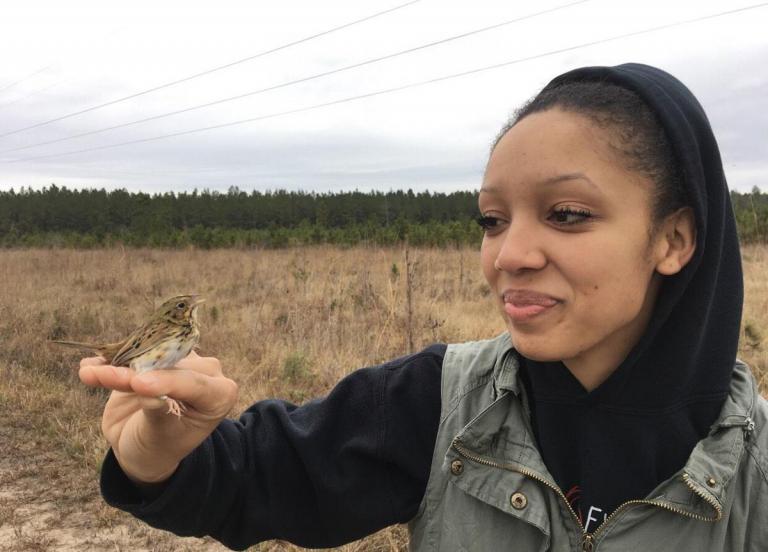
But before attending college at Malone University, an Evangelical Christian school, her academic study of natural science always existed separately from her faith. “They were incompatible,” she remembers. “Years of observing the reactions of other Christians to the natural sciences, namely in the exclusion of God from scientific explanations, molded my worldview in such a way that I believed that studying the physical was an active denial of the mysterious work of the Divine.”
Her college professors and mentors, however, provided a safe and healthy framework in which she could engage in thoughtful criticism of those worldviews. “After deconstructing the barriers that sequestered my faith from my studies, I was joyfully surprised to find the character and essence of God woven through every detail of the Creation that He spoke into existence.”
What truly captivates Corina Newsome are birds.
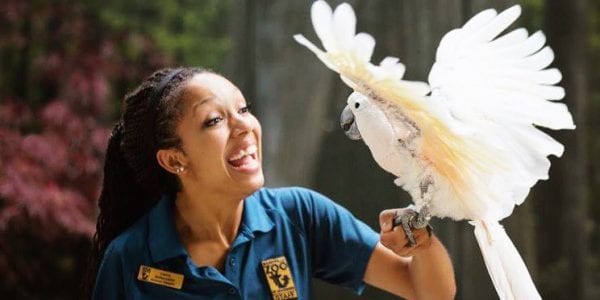
She recalls the first course she took on ornithology, the study of birds. “I never had any particular interest in birds, so I was not thrilled at the prospect of having to learn to identify over 150 of them. On the first day of class, my professor, Dr. Jason Courter, began with an introduction to the ten most common bird species in our area of northeast Ohio. He started with a species well-known to many: Blue Jays. When their picture was displayed on the board, I exclaimed, “THAT SPECIES LIVES HERE?” I had never seen one before. There were very few species of birds where I grew up in Philadelphia, and I barely noticed the ones we did have. But meeting the Blue Jay was all it took – I have been captivated by birds ever since.”
Yet she is acutely aware that human-caused global warming is threatening all species of wildlife.
“This warming results in drastic environmental changes that are happening so quickly that many species are unable to adapt,” she explains. “Although this is a desperately sad and discouraging reality to accept, there is one bit of hope: the same humans whose activity caused this unprecedented damage to the Earth have the potential to stop this destruction from running its full course. Still, it’s clear that taking the necessary collective steps to bring such a reality to fruition has proven to be a battle on many fronts.”
One of those fronts is the church itself. Corina has encountered many white evangelical Christians who dismiss environmental concerns and the truth about the changing climate. Some have mocked her concerns. Others have waved them away believing that “God will take care of it.”
But Corina encounters a different barrier when sharing her concerns with the churches in her neighborhood that are surrounded by deep-seated issues stemming from generational poverty and racism.
“The effects are visible everywhere, whether on the streets or in the pews – problems like poor healthcare, broken families, drugs, homelessness, hunger, and weak education systems. When I implored my church family to consider the natural world and God’s call for us to steward our resources wisely and live more sustainably, I discovered that other problems took priority,” she explains.
“If you don’t know how you will feed your family tonight, reducing your use of single-use plastics is hardly a concern. If you can’t be at home with your children because you have to work multiple jobs just to keep the electricity turned on, reducing your carbon footprint by carpooling to work is not on the to-do list. I was discouraged when my message was thwarted by these realities. But what could I say? Dealing with immediate challenges had to take precedence over other concerns.”
Yet she has found fellow believers concerned about environmental issues in an organization called Young Evangelicals for Climate Action (YECA).
She was invited to one of their conferences during her time at college. “At first, I had no interest because I assumed that because they were Evangelicals, they likely came from the same demographic that had so enraged me. But on the morning of the conference, I felt a sudden urge to attend. I vividly remember sitting in the conference, tearing up as I witnessed an impassioned group of people my own age encouraging us not to give up on the church. They urged us to encourage our faith communities to join this movement to address our collective impacts on the planet’s warming climate.”
This brought her a new perspective. “Yes, God instructs us to steward the Earth. But the climate crisis forces us to have a multidimensional understanding of that ethical requirement. Acting on climate change and protecting the natural world is a necessary extension of God’s command to love our neighbors as we love ourselves.”
This is the message she takes back to her neighborhood, to churches, to schools, to every person who comes to see the birds and animals she brings to her wildlife education events.
“I’ve come to firmly understand that acting on climate change is an issue of faith…and justice. Yes, climate change harms people, and is caused by people. But the hope for solutions to this problem lies within people.”
So what does she do when people disappoint her or threaten her hope? Texts like Isaiah 55:12, “the mountains and hills will burst into song before you, and all the trees of the field will clap their hands,” remind her of the restoration that comes from being in God’s sanctuary of Creation.
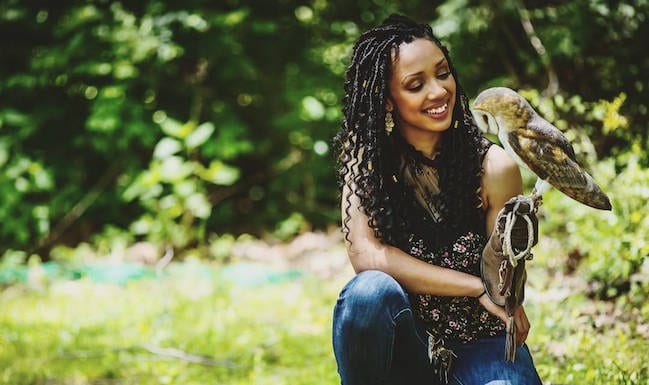
“When I am gripped by troubling thoughts and emotions, I thrust myself into the greenest space I can find, and I sit still. I know that, due to the precariousness of life, the survival of each living thing I encounter seems to hang almost constantly in the balance. Nevertheless, they burst with beauty, detail, and a very specific set of tools that allow them to persist for another moment. In surrounding myself with the richness of these truths, I find peace.”
From this green space of peace she finds renewed energy for her studies, her conservation efforts, and her work with the young children of color who she hopes will one day join her in this important work. I’ve seen the videos where they watch her wide-eyed with amazement as she introduces them to animals, reptiles, insects, and birds. The light in their eyes sparks hope in my heart.
You can read more about Corina’s adventures with birds, climate justice, and faith in her chapter “A Thing With Feathers” in Rooted and Rising: Voices of Courage in a Time of Climate Crisis. And follow her on Twitter: @hood_naturalist.
Read also:
“Green” Black History Month: Spotlight on Rev. Dr. Gerald Durley
Race, Faith, and the Climate Movement: Interview with Rev. Lennox Yearwood, Jr.
Climate Issues are Public Health Issues: Spotlight on Dr. Natasha DeJarnett
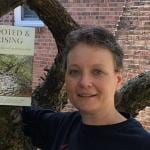
Leah D. Schade is the Assistant Professor of Preaching and Worship at Lexington Theological Seminary in Kentucky and ordained in the ELCA. Dr. Schade does not speak for LTS or the ELCA; her opinions are her own. She is the author of Preaching in the Purple Zone: Ministry in the Red-Blue Divide (Rowman & Littlefield, 2019), Rooted and Rising: Voices of Courage in a Time of Climate Crisis (Rowman & Littlefield, 2019), and Creation-Crisis Preaching: Ecology, Theology, and the Pulpit (Chalice Press, 2015).
Leah’s latest book is a Lenten devotional centered on Creation: For the Beauty of the Earth (Chalice Press, 2020).
Twitter: @LeahSchade
Facebook: https://www.facebook.com/LeahDSchade/


